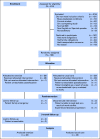Effects of Aerobic and Resistance Exercise on Metabolic Syndrome, Sarcopenic Obesity, and Circulating Biomarkers in Overweight or Obese Survivors of Breast Cancer: A Randomized Controlled Trial
- PMID: 29356607
- PMCID: PMC5858524
- DOI: 10.1200/JCO.2017.75.7526
Effects of Aerobic and Resistance Exercise on Metabolic Syndrome, Sarcopenic Obesity, and Circulating Biomarkers in Overweight or Obese Survivors of Breast Cancer: A Randomized Controlled Trial
Erratum in
Abstract
Purpose Metabolic syndrome is associated with an increased risk of cardiovascular disease, type 2 diabetes, and breast cancer recurrence in survivors of breast cancer. This randomized controlled trial assessed the effects of a 16-week combined aerobic and resistance exercise intervention on metabolic syndrome, sarcopenic obesity, and serum biomarkers among ethnically diverse, sedentary, overweight, or obese survivors of breast cancer. Methods Eligible survivors of breast cancer (N = 100) were randomly assigned to exercise (n = 50) or usual care (n = 50). The exercise group participated in supervised moderate-to-vigorous-65% to 85% of heart rate maximum-aerobic and resistance exercise three times per week for 16 weeks. Metabolic syndrome z-score (primary outcome), sarcopenic obesity, and serum biomarkers were measured at baseline, postintervention (4 months), and 3-month follow-up (exercise only). Results Participants were age 53 ± 10.4 years, 46% were obese, and 74% were ethnic minorities. Adherence to the intervention was 95%, and postintervention assessments were available in 91% of participants. Postintervention metabolic syndrome z-score was significantly improved in exercise versus usual care (between-group difference, -4.4; 95% CI, -5.9 to -2.7; P < .001). Sarcopenic obesity (appendicular skeletal mass index, P = .001; body mass index, P = .001) and circulating biomarkers, including insulin ( P = .002), IGF-1 ( P = .001), leptin ( P = .001), and adiponectin ( P = .001), were significantly improved postintervention compared with usual care. At 3-month follow-up, all metabolic syndrome variables remained significantly improved compared with baseline in the exercise group ( P < .01). Conclusion Combined resistance and aerobic exercise effectively attenuated metabolic syndrome, sarcopenic obesity, and relevant biomarkers in an ethnically diverse sample of sedentary, overweight, or obese survivors of breast cancer. Our findings suggest a targeted exercise prescription for improving metabolic syndrome in survivors of breast cancer and support the incorporation of supervised clinical exercise programs into breast cancer treatment and survivorship care plans.
Trial registration: ClinicalTrials.gov NCT01140282.
Figures
Comment in
-
Need to Distinguish the Term Sarcopenia From Risk Stratification Derived From Muscle Parameters.J Clin Oncol. 2018 Jul 10;36(20):2128-2129. doi: 10.1200/JCO.2018.78.6988. Epub 2018 May 30. J Clin Oncol. 2018. PMID: 29847291 No abstract available.
-
Reply to E. Parkin et al.J Clin Oncol. 2018 Jul 10;36(20):2129-2130. doi: 10.1200/JCO.2018.78.7754. Epub 2018 May 30. J Clin Oncol. 2018. PMID: 29847294 No abstract available.
References
-
- de Haas EC, Oosting SF, Lefrandt JD, et al. : The metabolic syndrome in cancer survivors. Lancet Oncol 11:193-203, 2010 - PubMed
-
- Russo A, Autelitano M, Bisanti L: Metabolic syndrome and cancer risk. Eur J Cancer 44:293-297, 2008 - PubMed
-
- Capasso I, Esposito E, Pentimalli F, et al. : Metabolic syndrome affects breast cancer risk in postmenopausal women: National Cancer Institute of Naples experience. Cancer Biol Ther 10:1240-1243, 2010 - PubMed
-
- Pasanisi P, Berrino F, De Petris M, et al. : Metabolic syndrome as a prognostic factor for breast cancer recurrences. Int J Cancer 119:236-238, 2006 - PubMed
Publication types
MeSH terms
Substances
Associated data
Grants and funding
LinkOut - more resources
Full Text Sources
Other Literature Sources
Medical
Miscellaneous


